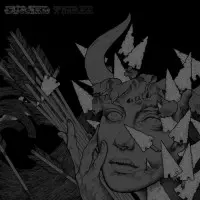Despising work, criticizing religion and complaining about politics. These are the topics discussed within Cursed's aptly titled third album, III. They aren't exactly finding unclaimed land with these lyrics, but it's blatantly obvious that singer Chris Colohan means every single word of it. Some hardcore bands make the mistake of thinking louder screaming equals a more pissed off disposition. Offering an antithesis to this unfortunate trend, Cursed songs sound like the angry ravings of a primal madman set to thrashy guitars and pounding drums. To push the intensity even further, Colohan will often go off on random screaming tangents with Sam Kinison-like poise.
The album starts with "Architects of Troubled Sleep," a sound collage with sound clips played over it. It's almost standard procedure that the next track burst out with a blaze of glory. "Night Terrors" is no exception to this rule, although it does a very good job of gripping you and not letting go. This still comes as somewhat of a shock and surprise, even though it's exactly as expected.
Compared to the last two albums, I enjoyed the riffs and song structures a lot more on this album. There is not one song that just plays out like it begins. There's always something interesting thrown in. The song "Anithero Resuscitator" is a good example of this. The song could make an admirable opening track, with its introduction building suspense into the first verse. The next song, however, shows that the band is up for some experimentation.
Offering up criticism towards the music industry, the album's fifth track, "Friends in the Music Business" is sort of a change of pace for Cursed. Clocking in at 4:52, the song has a sludgy feel with its bass-heavy rhythm section leading the song. The song is slower than any of the previous tracks, but it feels like it's at the perfect length. The track is most likely my favorite on the album due to its infectious rhythm. It stays with you long after Colohan finishes chanting the line "Don't call me and I won't call you" verbatim.
The album goes on until the title track, an intriguing instrumental, seeps into "Unnecessary Person," a slower song that has a laggard tempo but is not at all spiritless. This segues into the faster, more relentless "Hegel's Bastards" and "Dead Air at the Pulpit," until we reach the album closer, the atmospheric, instrumental "Gutters." Unfortunately, this song lags and probably needed to be cut in half.
This album marked some experimentation with sound and production for this Canadian band. It still featured their ferocity and it never let up. I'd be willing to say that this is their best album. Fans of their previous efforts will no doubt be ecstatic to hear the same tenacious aggression they've become accustomed to.
